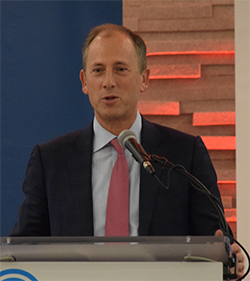11/19/2019
J. David Heller Gives Impressions About JFNA’s FedLab
- Share This Story

J. David Heller was a representative of the Jewish Federation of Cleveland at the JFNA FedLab.
Article reprinted with permission from Cleveland Jewish News
by JANE KAUFMAN | STAFF REPORTER
J. David Heller, board chair of the Jewish Federation of Cleveland, attended FedLab, a three-day conference for the top volunteer and staff of Jewish Federations of North America. The conference, which attracted 900 people and was styled as three in-depth workshop tracks, was held from Nov. 10 to Nov. 12. in Washington, D.C.
Next year, JFNA will return to its General Assembly convention format in Chicago, which will be structured for 3,000 people.
Eric D. Fingerhut, new CEO of JFNA, said the format was envisioned as a way for professionals to delve deeply into the content and hear from the experts.
“We want to really be able to learn from each other and learn from experts and roll up our sleeves. Instead of some of the more formal sessions and speeches and dignitaries that we tend to have at the GA and we will go back to that in 2020 in Chicago,” Fingerhut told the Cleveland Jewish News before the conference began. “But we decided to have a real working and roll up your sleeves session, like a laboratory, that’s why it’s called FedLab ... I think you’re going to see each community coming back with a sense of what are the new ideas.”
Heller answered questions via email.
CJN: What was the structure of the conference? How has it changed? What was different from past years’ events? What was similar?
HELLER: FedLab was a completely difference conference from General Assembly because attendees were focused on three specific tracks: security, poverty, and engagement. Each delegate chose a track, and each track was uniquely facilitated so that delegates could bring home more information. The entire group was involved in giving input and ideas.
There were only a small handful of plenaries at FedLab. The speakers were outstanding:
- Sarah Hurwitz was interviewed by Erica Brown. Sarah was ) frormer first lady Michelle Obama’s former speechwriter and author of the book, “Here All Along: Finding Meaning, Spirituality, and a Deeper Connection to Life – in Judaism.”
- Li-or Zoref talked about crowdsourcing, and why when our Jewish community puts our brains together, we can come up with a more accurate strategy. He used an actual python snake as an example during his speech.
CJN: What do you feel Eric Fingerhut brings to the table?
HELLER: Eric is an aspirational leader that has a great depth of experience working with different organizations and different types of people with different political perspectives in order to achieve success. At Hillel, one of his greatest successes was talent development, and certainly this focus on developing talent (both lay and professional) is a shared priority between the Jewish Federation of Cleveland and Jewish Federations of North America.
CJN: In what ways are JFNA’s priorities shifting under Fingerhut’s leadership?
HELLER: Priorities shift with the times. We all try to be relevant to what’s happening in our world so today, security is a top priority. As the environment changes, JFNA will evolve and change. We’re looking at the Cleveland Jewish community and our role within Cleveland and other communities, both nationally and globally, whereas JFNA is taking in the picture from a national lens.
CJN: What is the blueprint moving forward?
HELLER: That’s a question for Eric and his team at JFNA. While I can’t speak for the JFNA “blueprint,” I can tell you that here in Cleveland, we are focused on how we care for the most vulnerable, educate the next generation Jews and develop the next generation of leaders, how we can be the most welcoming as we can be. Despite security concerns, we are making sure that security does not define us. We are here to care about people and educate people.
CJN: Fingerhut was in Halle, Germany, prior to FedLab. Did he discuss that?
HELLER: Yes, he did. The doors of the synagogue had been reinforced and cameras in which the terrorist were spotted were funded through Federations’ annual campaigns. Eric met with some of the folks in the congregation on that day and met with the German Foreign Minister and U.S. Secretary of State Mike Pompeo at the same time. Part of Eric’s remarks was that Halle is such a small synagogue and it is not in a wealthy community, so without the support from Jews from around the world, there would’ve been a massacre. When we think about our responsibility in Cleveland, we secure our community but we also want to make sure other communities are safe. While we were safe in our synagogues on Yom Kippur, we were also protecting our Jewish family in other parts of the world.
CJN: How is the JFNA responding to the rising level of anti-Semitism in the world?
HELLER: Through SCN (Security Community Network) and through the security funding that flows through The Jewish Agency. The Jewish Federation of Cleveland is continuously working to enhance our relationships with the greater Cleveland community through our work of the community relations committee, the Adler Civic Leaders Mission to Israel and the Business Leaders Mission to Israel. All of these are efforts to engage the community to build understanding around the issue of anti-Semitism and how anti-Zionism is a masked form of anti-Semitism. Our community partners we have engaged within Cleveland have been incredible allies in the fight against anti-Semitism. This is something we shared with other communities at FedLab.
CJN: What are the key takeaways for Cleveland?
HELLER: We can feel pride in Jewish Cleveland that we are offering high-quality programs to our community members.


Comments